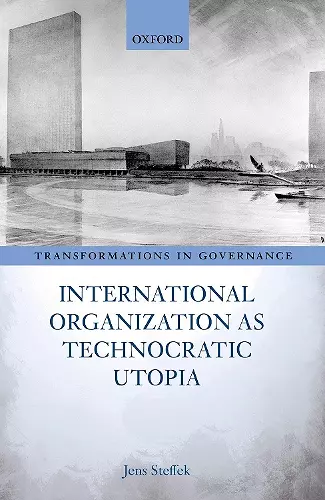International Organization as Technocratic Utopia
Format:Hardback
Publisher:Oxford University Press
Published:12th Aug '21
Currently unavailable, and unfortunately no date known when it will be back

This is an open access title available under the terms of a CC BY-NC-ND 4.0 International license. It is free to read at [Oxford Scholarship Online and offered as a free PDF download from OUP and selected open access locations. As climate change and a pandemic pose enormous challenges to humankind, the concept of expert governance gains new traction. This book revisits the idea that scientists, bureaucrats, and lawyers, rather than politicians or diplomats, should manage international relations. It shows that this technocratic approach has been a persistent theme in writings about international relations, both academic and policy-oriented, since the 19th century. The technocratic tradition of international thought unfolded in four phases, which were closely related to domestic processes of modernization and rationalization. The pioneering phase lasted from the Congress of Vienna to the First World War. In these years, philosophers, law scholars, and early social scientists began to combine internationalism and ideals of expert governance. Between the two world wars, a utopian period followed that was marked by visions of technocratic international organizations that would have overcome the principle of territoriality. In the third phase, from the 1940s to the 1960s, technocracy became the dominant paradigm of international institution-building. That paradigm began to disintegrate from the 1970s onwards, but important elements remain until the present day. The specific promise of technocratic internationalism is its ability to transform violent and unpredictable international politics into orderly and competent public administration. Such ideas also had political clout. This book shows how they left their mark on the League of Nations, the functional branches of the United Nations system and the European integration project. Transformations in Governance is a major academic book series from Oxford University Press. It is designed to accommodate the impressive growth of research in comparative politics, international relations, public policy, federalism, and environmental and urban studies concerned with the dispersion of authority from central states to supranational institutions, subnational governments, and public-private networks. It brings together work that advances our understanding of the organization, causes, and consequences of multilevel and complex governance. The series is selective, containing annually a small number of books of exceptionally high quality by leading and emerging scholars. The series is edited by Liesbet Hooghe and Gary Marks of the University of North Carolina, Chapel Hill, and Walter Mattli of the University of Oxford
a book that makes several important contributions. * Tana Johnson, Perspectives on Politics *
Steffek's book should be praised for many aspects, starting from the originality and depth of his analysis... [it] represents a fantastic resource to think about the backlash against international organizations (and particular against its technocratic elements) in a historical perspective. Jens Steffek's book offers a fascinating analysis of the intellectual history of international organizations that offers many relevant insights to our discipline... He does so by tackling the question of why they do so -- that is, 'how it happened that people came to believe in the virtues of global bureaucracies in the first place'. * Margherita Melillo, Leiden Journal of International Law, Cambridge University Press *
a rich intellectual history of 'technocratic internationalism', as a unique tradition of internationalist thought originating amongst European thinkers...an original and thought-provoking history of intellectuals' advocacy for the rule of expert in the 19th and 20th centuries...shedding light on the life and functioning of 'technocratic internationalism' beyond its familiar liberal origin and across various strands of politics...Steffek has masterfully explored technocratic internationalism in the thoughts of anti-capitalist intellectuals. * Negar Mansouri, Journal of the History of International Law *
International Organization as Technocratic Utopia measures as an unqualified success. This is compulsory reading for anyone interested in international organizations (plural) as well as international organization (singular). * Jan Klabbers, European Journal of International Law *
Not a small feat for a work of history, International Organization as Technocratic Utopia has its fingers on the pulse of our time...creative and thought-provoking * Jan Eijking, Journal of International Political Theory *
ISBN: 9780192845573
Dimensions: 240mm x 164mm x 19mm
Weight: 538g
246 pages